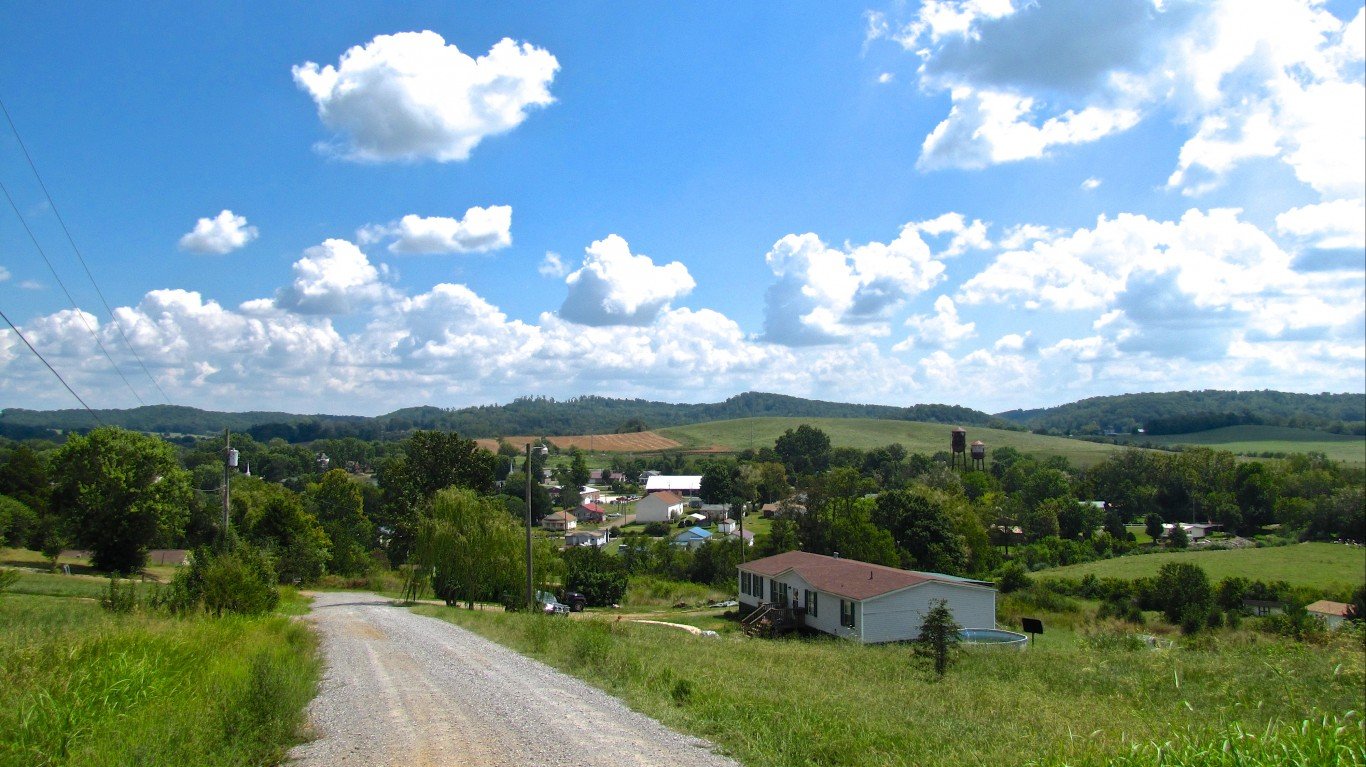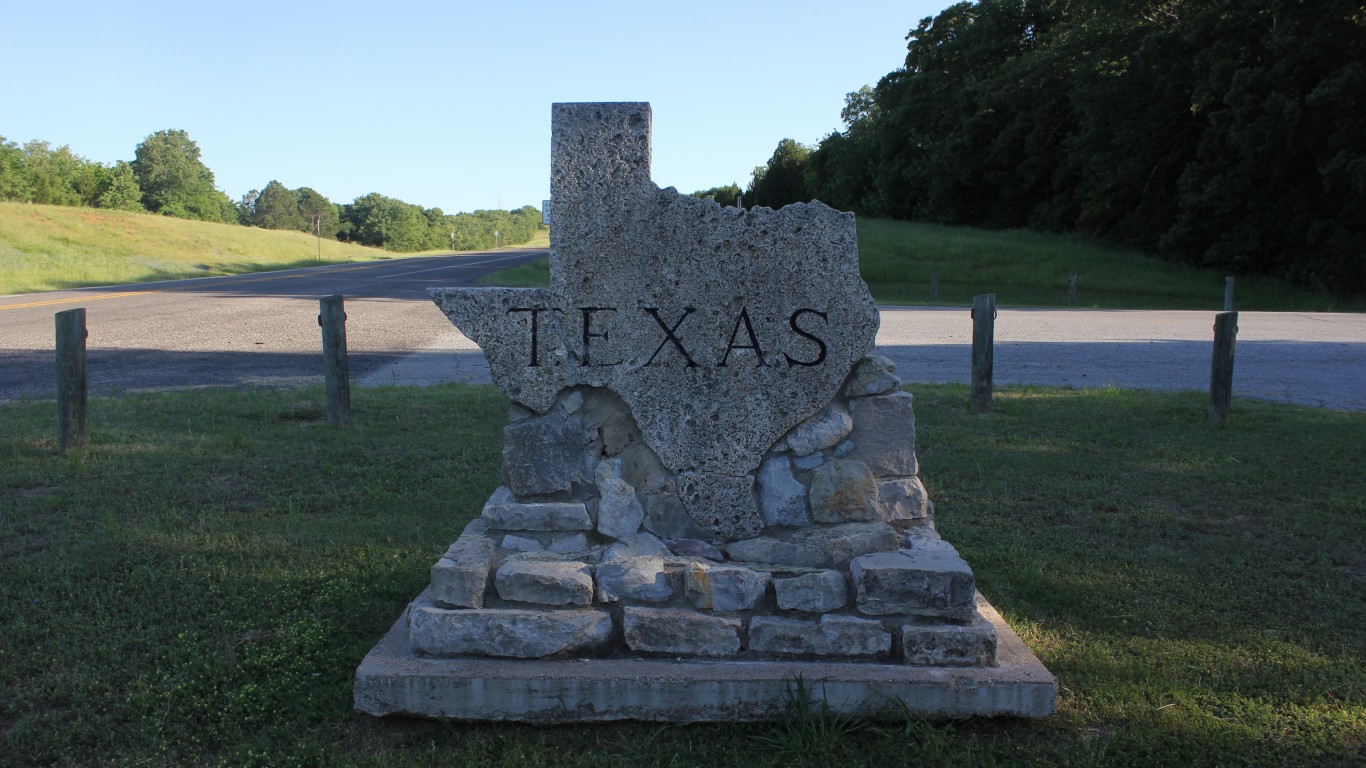

One of the reasons that many Americans get up and go to work every day is to put some money away for retirement. While Social Security payments can be a helpful financial pillar in retirement, it is hardly enough to cover any but the most basic expenditures.
Based on average annual spending for American seniors and the national average life expectancy at age 65 of 19.4 years, the average American will spend about $987,000 from retirement age on. And those planning for a more comfortable and financially secure retirement should plan on saving a little more.
Of course, both cost of living and life expectancy vary considerably by state — and so, too, does the cost of retirement. Using the average annual spending of Americans 65 and older — adjusted at the state level for cost of living and life expectancy — 24/7 Wall St. calculated what it will cost to retire comfortably in each state. All data used in the ranking came from the Bureau of Economic Analysis, the Bureau of Labor Statistics, and the Institute for Health Metrics and Evaluation.
One of the best ways to prepare financially is through retirement-specific accounts, like IRAs or 401(k)s. These types of funds offer special tax benefits and can often come with employer matches. Those who fail to save enough and take advantage of options like these — or draw from them before they hit retirement age — may have to work past age 65 in order to pay the bills. Here is how early withdrawals from an IRA for 401K can kill your retirement.
Just how much one needs to save to comfortably to meet expected spending from age 65 on depends on a number of factors. Many who work in the public sector, for example, may benefit in retirement from regular pension payments, in addition to Social Security. Just how high those pension payments are vary by state and employer. Even in some of the most expensive places to retire, state subsidies can help finance the cost of retirement. These are the states spending the most to fund their residents’ retirement.
Click here to see what it costs to retire comfortably in every state
Click here to read our methodology
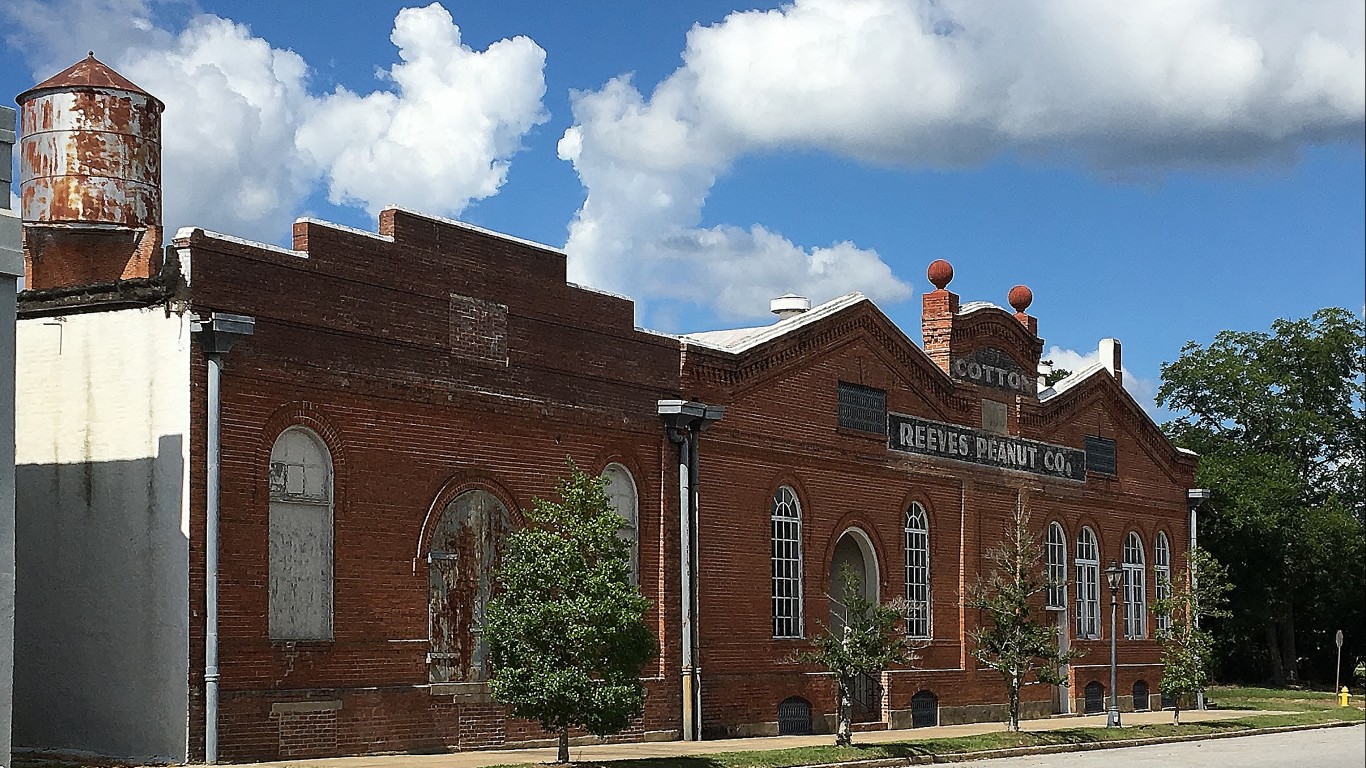
1. Alabama
> Est. total retirement spending: $897,566 (3rd least)
> Avg. cost of living: 13.3% less than avg.
> Avg. monthly homeownership cost for senior citizens: $357 (5th lowest)
> Pop. 65 and older: 17.0% (18th highest)
In Alabama, residents need an average of about $898,000 to live out their retirement years in relative comfort — below the national average of about $1.1 million. Retirees in Alabama need less retirement savings because of both lower average life expectancy and lower cost of living.
Life expectancy at age 65 in the state is slightly less than 17.7 years, nearly two years below the national average. Additionally, goods and services are about 13% less expensive on average in Alabama than they are nationwide.
[in-text-ad]
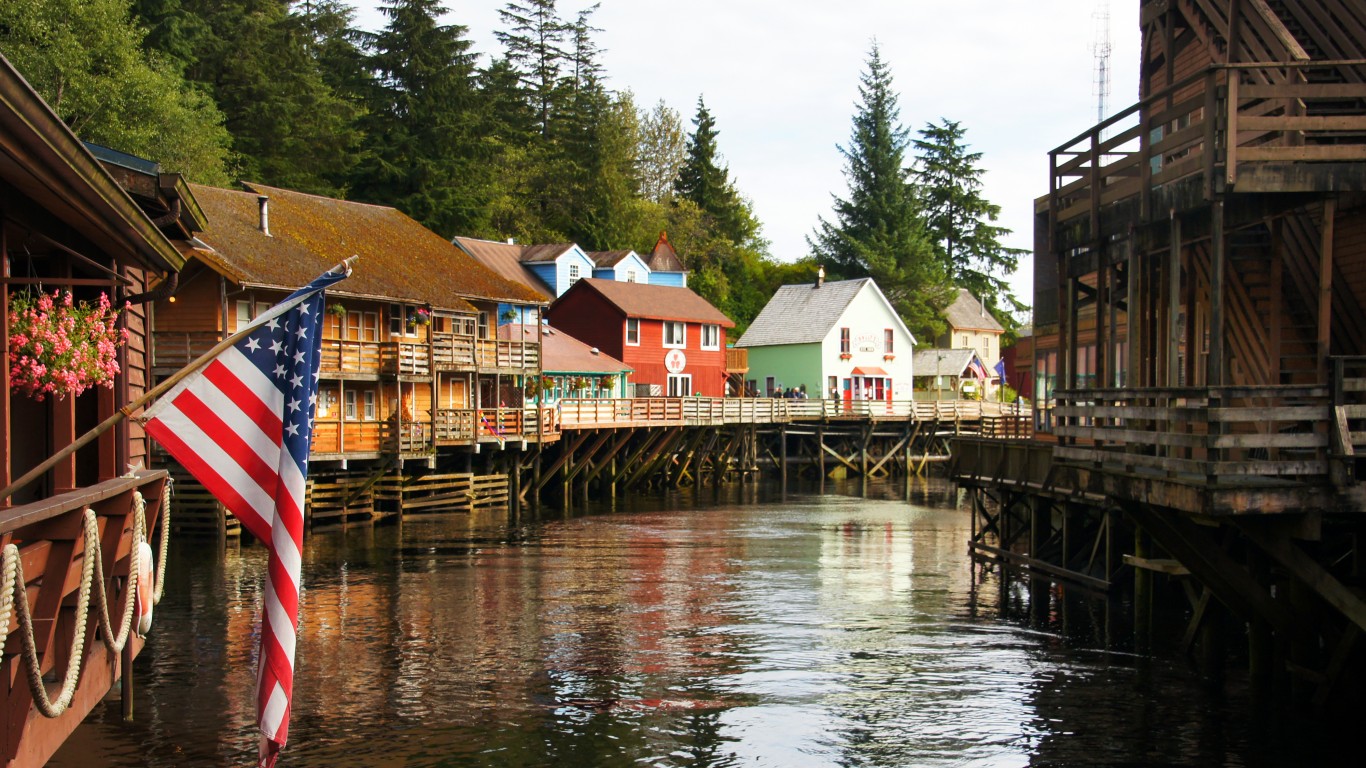
2. Alaska
> Est. total retirement spending: $1,166,294 (13th most)
> Avg. cost of living: 4.4% more than avg.
> Avg. monthly homeownership cost for senior citizens: $504 (19th highest)
> Pop. 65 and older: 11.9% (2nd lowest)
Retirees need to save an estimated average of nearly $1.2 million to live out their years in comfort in Alaska. The estimated need for retirement savings in the state is higher than in most states due in large part to the high cost of living in the state. Goods and services are 4.4% more expensive across Alaska on average than they are nationwide. Even without a mortgage, home ownership costs an average of $504 a month among the retirement age population, more than in all but a handful of states.

3. Arizona
> Est. total retirement spending: $1,133,306 (18th most)
> Avg. cost of living: 3.6% less than avg.
> Avg. monthly homeownership cost for senior citizens: $410 (15th lowest)
> Pop. 65 and older: 17.6% (11th highest)
With a warm climate and a relatively low cost of living, Arizona is an ideal state for many Americans to retire. Of the state’s population, 17.6% of residents are 65 or older, compared to 16.0% of the total U.S. population.
The estimated average savings necessary for a comfortable retirement in Arizona is $1.1 million, more than in most states. This is due in large part to the high life expectancy in the state. Those who are 65 years old in Arizona are expected to live an additional 20 years on average, almost a year longer than the national average.
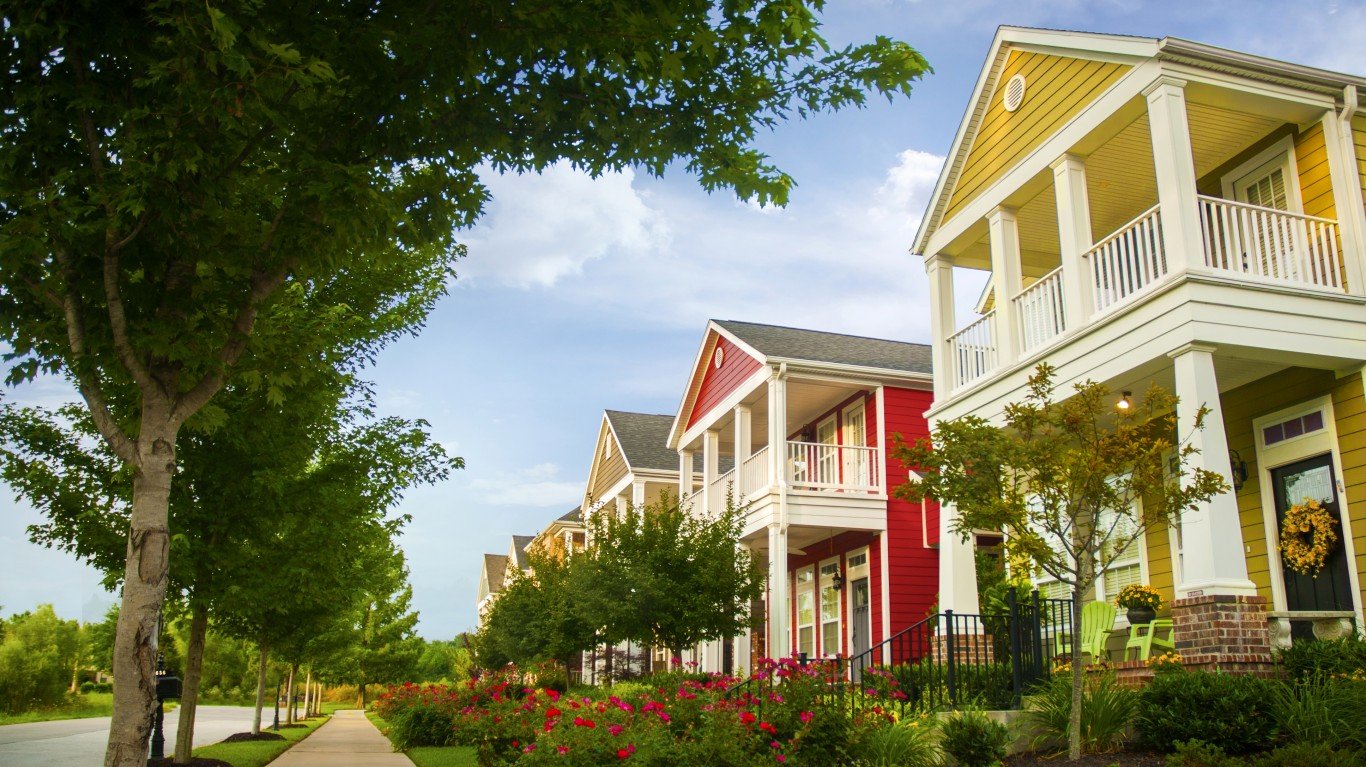
4. Arkansas
> Est. total retirement spending: $905,614 (5th least)
> Avg. cost of living: 13.5% less than avg.
> Avg. monthly homeownership cost for senior citizens: $355 (4th lowest)
> Pop. 65 and older: 16.8% (22nd highest)
Arkansas is one of only a dozen states where residents can retire and live comfortably while spending less than $1 million. This is due to the state’s low cost of living and low life expectancy. Goods and services in Arkansas are 13.5% less expensive than they are nationwide, on average, and those who are 65 can expect to live to 82.9, on average, below the 84.4 year national average life expectancy at 65.
[in-text-ad-2]
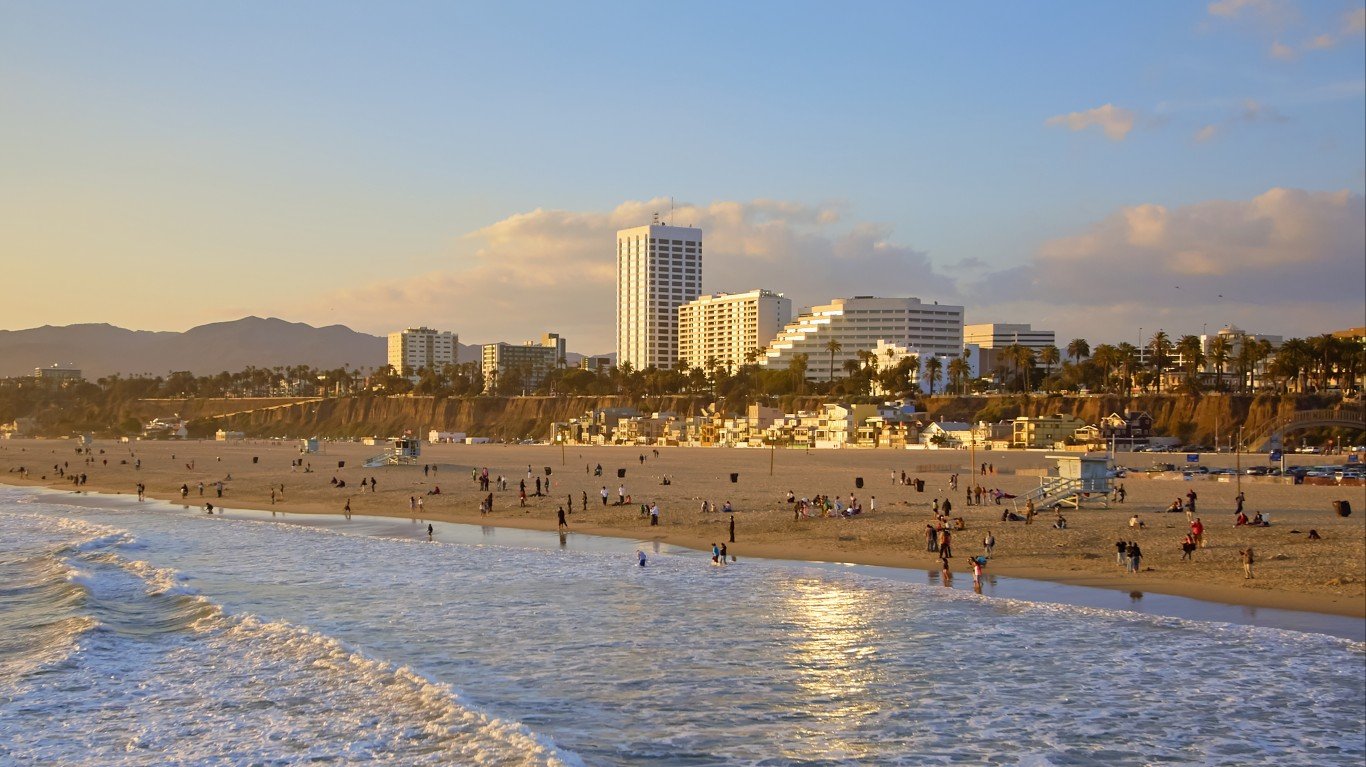
5. California
> Est. total retirement spending: $1,389,909 (3rd most)
> Avg. cost of living: 14.8% more than avg.
> Avg. monthly homeownership cost for senior citizens: $567 (11th highest)
> Pop. 65 and older: 14.3% (6th lowest)
California has one of the highest costs of living of any state in the country — as well as one of the highest life expectancies. Goods and services are nearly 15% more expensive in California on average than they are nationwide, and average life expectancy at age 65 in the state is 85.7 years, nearly a year and a half longer than national average.
As a result, for a comfortable retirement in the state, residents would need an average of about $1.4 million in savings, more than in every other state apart from Hawaii and New York.

6. Colorado
> Est. total retirement spending: $1,207,213 (9th most)
> Avg. cost of living: 3.2% more than avg.
> Avg. monthly homeownership cost for senior citizens: $459 (23rd lowest)
> Pop. 65 and older: 14.2% (5th lowest)
The average Colorado retiree would need about $1.2 million in savings to live comfortably, which is higher than in 41 states. The relatively high cost of living in the state may help explain why so many Colorado senior citizens continue to work after the traditional retirement age. Among the state’s senior households, 41.5% have wage earnings, compared to the national share of 38.0% of senior households.
[in-text-ad]

7. Connecticut
> Est. total retirement spending: $1,288,630 (5th most)
> Avg. cost of living: 8.0% more than avg.
> Avg. monthly homeownership cost for senior citizens: $870 (2nd highest)
> Pop. 65 and older: 17.2% (15th highest)
Housing costs are high for senior citizens living in Connecticut. The average monthly cost of homeownership among the 65 and older population is $870 without a mortgage and $1,481 with — the second and 13th highest costs, respectively, among states.
Partially as a result, retirement is more expensive in Connecticut than in most other states. Living comfortably for the 20.4 years Connecticut residents live, on average, after age 65, costs an estimated $1.3 million average, more than in all but four other states.

8. Delaware
> Est. total retirement spending: $1,135,821 (16th most)
> Avg. cost of living: 0.1% more than avg.
> Avg. monthly homeownership cost for senior citizens: $451 (20th lowest)
> Pop. 65 and older: 18.7% (6th highest)
For those who reach age 65 in Delaware, the average life expectancy is 84.4 years. Living out those years in relative comfort will cost an estimated $1.1 million on average — roughly in line with the national average cost of retirement.

9. Florida
> Est. total retirement spending: $1,186,139 (12th most)
> Avg. cost of living: 0.1% less than avg.
> Avg. monthly homeownership cost for senior citizens: $494 (21st highest)
> Pop. 65 and older: 20.5% (2nd highest)
Florida’s warm climate makes it an ideal location for many Americans to retire. In fact, more than one in every five residents of the Sunshine State are 65 or older, the second largest share of any state in the country. Residents who are 65 in the state are expected to live to an average of just over 85, about a year longer than the national average.
Due in part to the higher life expectancy, the estimated retirement costs in Florida are $1,186,139, greater than the $1,134,687 national average.
[in-text-ad-2]

10. Georgia
> Est. total retirement spending: $1,000,893 (15th least)
> Avg. cost of living: 7.5% less than avg.
> Avg. monthly homeownership cost for senior citizens: $400 (12th lowest)
> Pop. 65 and older: 13.8% (4th lowest)
The average life expectancy for Georgia residents at age 65 is 83.5 years, about a year shy of the national average. Additionally, goods and services are 7.5% less expensive in Georgia than they are nationwide. As a result, the average estimated cost of a comfortable retirement in the state is just over $1 million — slightly below the $1.1 million average nationwide.

11. Hawaii
> Est. total retirement spending: $1,490,153 (the most)
> Avg. cost of living: 18.5% more than avg.
> Avg. monthly homeownership cost for senior citizens: $518 (16th highest)
> Pop. 65 and older: 18.4% (7th highest)
While Hawaii’s warm climate may make it an ideal state for many Americans to retire in, it is also the most expensive state in the country in which to retire. Goods and services in Hawaii are 18.5% more expensive than they are nationwide, on average. Life expectancy at 65 is also longer than average in Hawaii. As a result, retirees in the state can expect to need about $1.5 million to live out their golden years in comfort, well above the $1.1 million national average.
[in-text-ad]
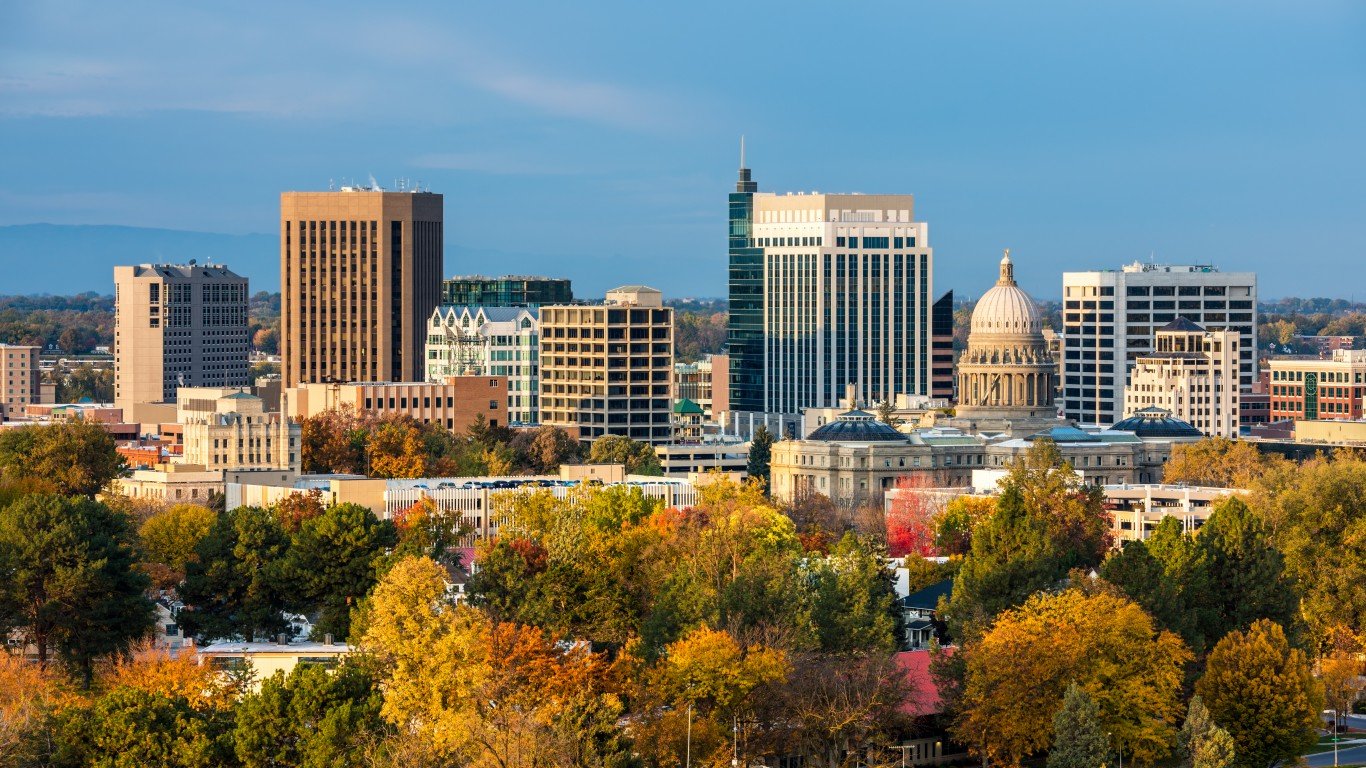
12. Idaho
> Est. total retirement spending: $1,055,259 (22nd least)
> Avg. cost of living: 7.0% less than avg.
> Avg. monthly homeownership cost for senior citizens: $364 (7th lowest)
> Pop. 65 and older: 15.9% (20th lowest)
Those who retire in Idaho can expect to spend less to live comfortably than those who retire in most other states. Due in part to Idaho’s lower than average cost of living — particularly the state’s low housing costs — retirees will spend an estimated average of $1,055,259 to live comfortably. That is about $80,000 less than the national average, even though life expectancy at age 65 in Idaho is the same as it is nationwide.

13. Illinois
> Est. total retirement spending: $1,123,427 (20th most)
> Avg. cost of living: 1.5% less than avg.
> Avg. monthly homeownership cost for senior citizens: $609 (9th highest)
> Pop. 65 and older: 15.6% (12th lowest)
Retiring comfortably in Illinois today would require an estimated $1.1 million, in line with the national average. Though the overall cost of living across the state is less than average, housing costs are relatively high. The average monthly cost of homeownership for state residents of retirement age is $609 without a mortgage and $1,458 with a mortgage, ninth highest and 14th highest among states, respectively.

14. Indiana
> Est. total retirement spending: $966,425 (10th least)
> Avg. cost of living: 10.2% less than avg.
> Avg. monthly homeownership cost for senior citizens: $399 (11th lowest)
> Pop. 65 and older: 15.7% (15th lowest)
Like many states in the Midwest, Indiana has a low cost of living. Goods and services in the state are 10.2% less expensive than they are on average nationwide. Partially as a result, a comfortable retirement is relatively inexpensive in the state.
Indiana residents who are 65 are expected to live, on average, about 18 and a half years longer, roughly in line with the national figure. And to live comfortably throughout those years will cost an estimated $966,425, which is less than retirement costs in most parts of the country.
[in-text-ad-2]

15. Iowa
> Est. total retirement spending: $1,024,201 (19th least)
> Avg. cost of living: 10.2% less than avg.
> Avg. monthly homeownership cost for senior citizens: $473 (25th highest)
> Pop. 65 and older: 17.0% (18th highest)
A comfortable retirement in Iowa will cost an estimated $1,024,201, less than in most states and below the national average of $1,134,687. The typical retirement age household in the state earns $47,784 a year, below the national median earnings nationwide for households in that age group of $61,559.
16. Kansas
> Est. total retirement spending: $1,000,162 (13th least)
> Avg. cost of living: 10.0% less than avg.
> Avg. monthly homeownership cost for senior citizens: $510 (17th highest)
> Pop. 65 and older: 15.9% (20th lowest)
Those who retire in Kansas can reasonably expect to spend just over a million dollars to live a relatively comfortable lifestyle after age 65. Retirement cost in Kansas is lower than in most states as a result of the state’s relatively low cost of living. Goods and services are about 10% less expensive than they are, on average, nationwide.
[in-text-ad]
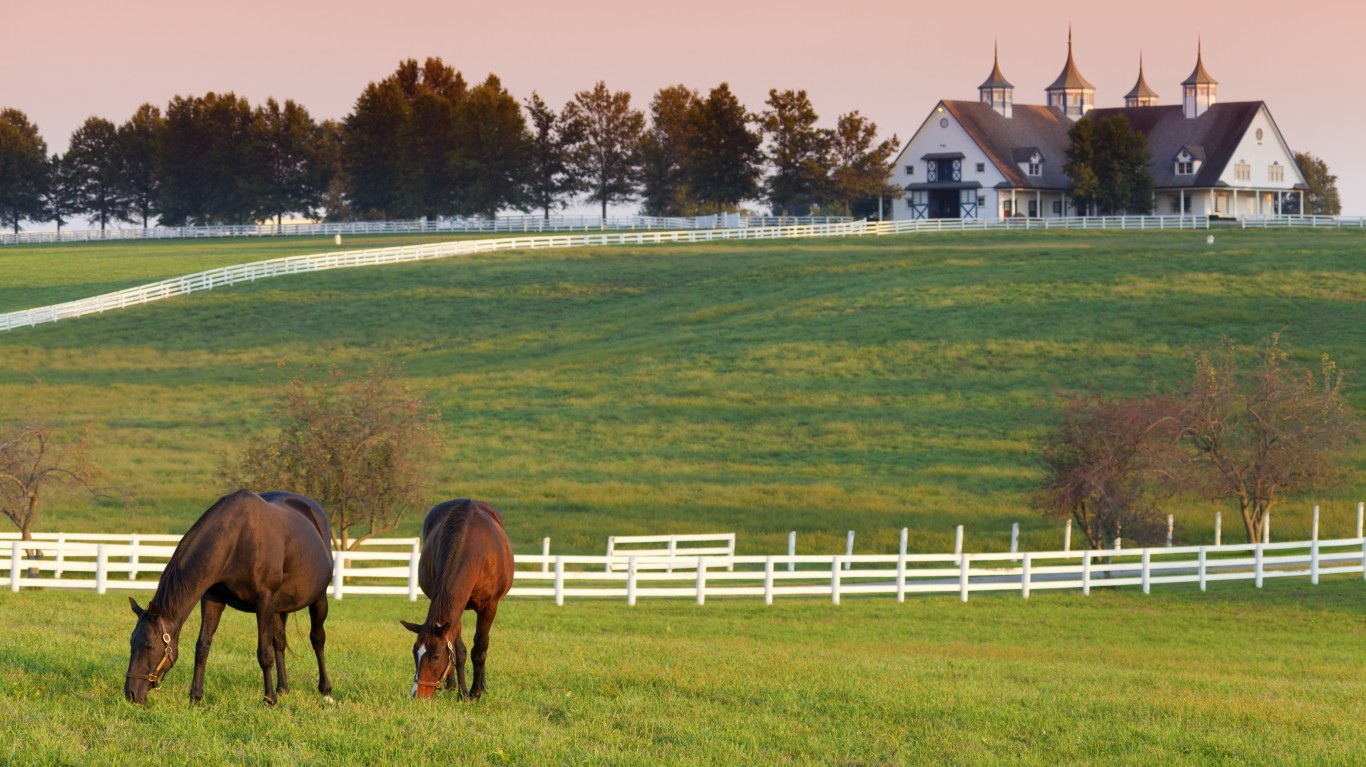
17. Kentucky
> Est. total retirement spending: $899,707 (4th least)
> Avg. cost of living: 12.1% less than avg.
> Avg. monthly homeownership cost for senior citizens: $372 (8th lowest)
> Pop. 65 and older: 16.4% (25th lowest)
Kentucky is one of only four states where a comfortable retirement costs an average of less than $900,000. In addition to the state’s relatively low cost of living, another reason retirement costs are low is due to a lower than average life expectancy. Kentucky residents are expected to live an average of about 17 and a half years past 65, about two years less than the national average.

18. Louisiana
> Est. total retirement spending: $953,844 (8th least)
> Avg. cost of living: 9.9% less than avg.
> Avg. monthly homeownership cost for senior citizens: $340 (2nd lowest)
> Pop. 65 and older: 15.5% (11th lowest)
Adjusted for the state’s relatively low cost of living, Louisiana residents spend an average of about $45,825 a year after age 65. And the average life expectancy for those who are 65 in the state is just over 18 years to 83.1 years. On average, retirees in the state can expect to spend about about $954,000 — including an additional 15% to live comfortably — throughout their golden years, less than in most other states.

19. Maine
> Est. total retirement spending: $1,076,244 (25th most)
> Avg. cost of living: 1.6% less than avg.
> Avg. monthly homeownership cost for senior citizens: $501 (20th highest)
> Pop. 65 and older: 20.6% (the highest)
Retirement-age residents account for 20.6% of Maine’s total population, the largest share of any state in the country. Accounting for the state’s slightly lower than average cost of living, as well as its slightly lower than average life expectancy at 65, a comfortable retirement in Maine will cost an estimated $1,076,244, compared to the national estimate average of $1,134,687.
[in-text-ad-2]
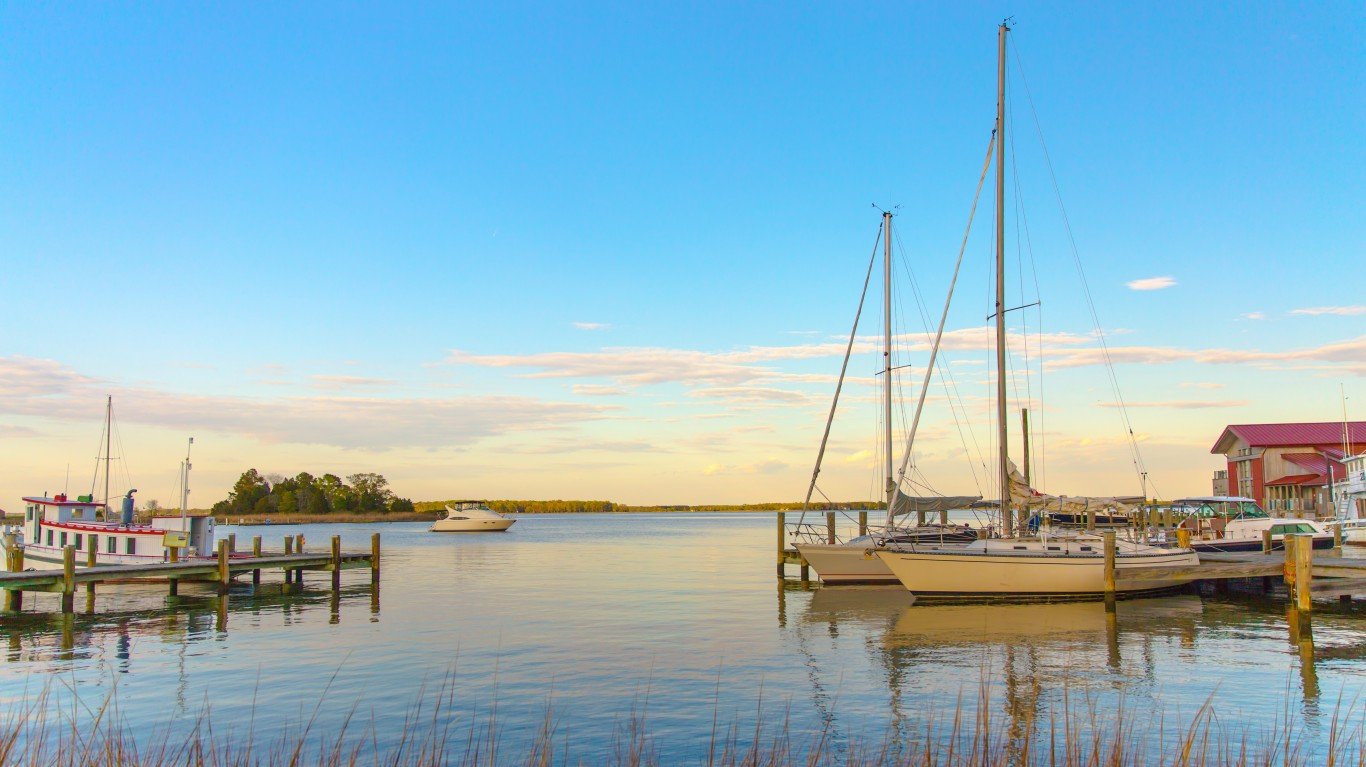
20. Maryland
> Est. total retirement spending: $1,254,145 (7th most)
> Avg. cost of living: 9.4% more than avg.
> Avg. monthly homeownership cost for senior citizens: $615 (8th highest)
> Pop. 65 and older: 15.4% (9th lowest)
Maryland is one of the most expensive states in the country — and partially as a result, it is not an inexpensive place to retire. Life expectancy in Maryland after age 65 is nearly 20 years on average, and living comfortably over those years — based on average annual spending of 65 and older households — will cost an estimated total of about $1.3 million. Nationwide, retirement costs an estimated $1.1 million on average.
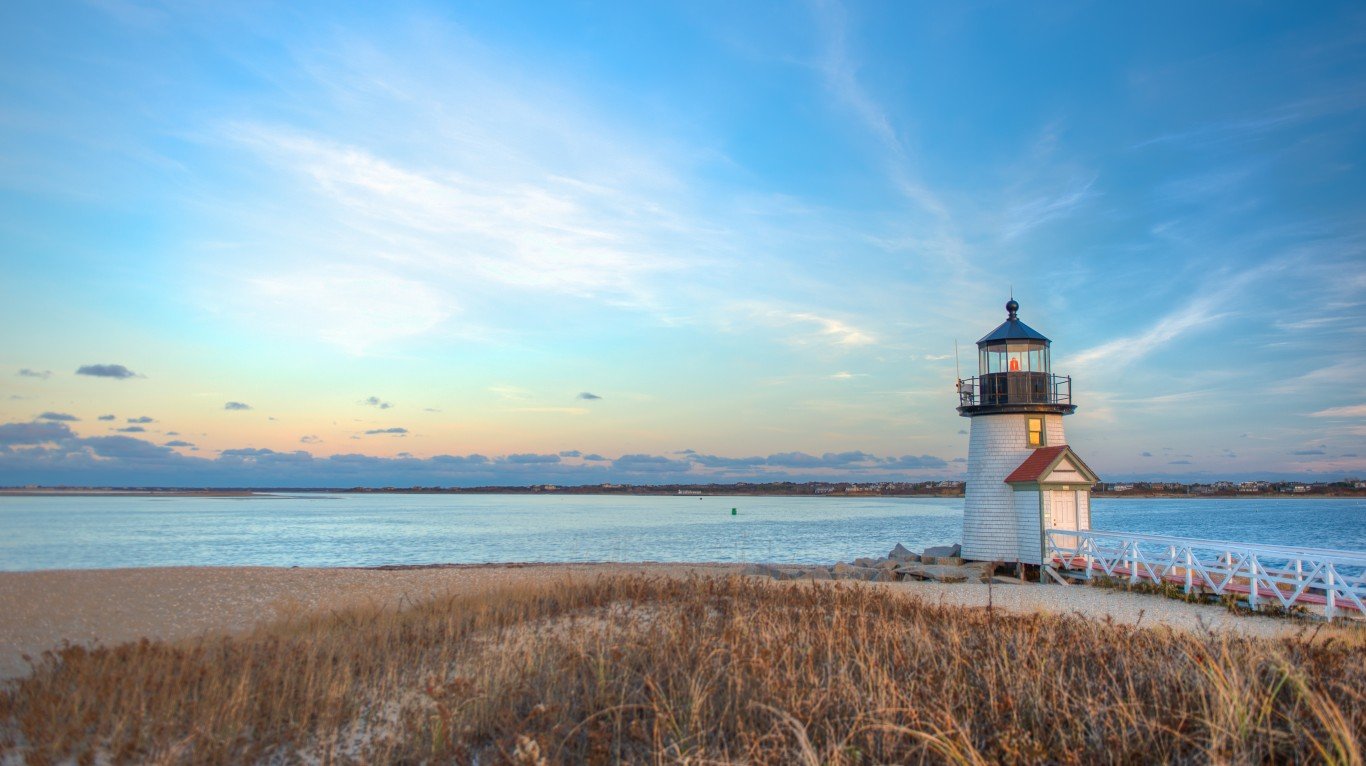
21. Massachusetts
> Est. total retirement spending: $1,255,882 (6th most)
> Avg. cost of living: 7.9% more than avg.
> Avg. monthly homeownership cost for senior citizens: $794 (3rd highest)
> Pop. 65 and older: 16.5% (25th highest)
The total estimated cost of living comfortably in retirement years in Massachusetts is about $1.3 million, more than in all but five other states. The higher expenses in retirement are attributable in part to the higher cost of living in the state. Median homeownership costs in Massachusetts for 65 and older households without a mortgage are $794 and $1,842 with a mortgage, the third and fourth highest among states, respectively. Overall, goods and services are nearly 8% more expensive across Massachusetts than they are, on average, nationwide.
[in-text-ad]

22. Michigan
> Est. total retirement spending: $1,028,061 (21st least)
> Avg. cost of living: 7.0% less than avg.
> Avg. monthly homeownership cost for senior citizens: $477 (23rd highest)
> Pop. 65 and older: 17.2% (15th highest)
The average estimated cost of retirement in Michigan is $1,028,061, slightly less than the national average of $1,134,687. The lower retirement cost is driven by lower living expenses as goods and services in Michigan are 7% less expensive than the national average.
Michigan residents are also less likely to have to work into retirement age. Just 33.5% of state residents 65 and older are earning a wage or salary, nearly the lowest share of any state.

23. Minnesota
> Est. total retirement spending: $1,157,644 (15th most)
> Avg. cost of living: 2.5% less than avg.
> Avg. monthly homeownership cost for senior citizens: $524 (15th highest)
> Pop. 65 and older: 15.8% (17th lowest)
Minnesota’s cost of living is roughly in line with that of the nation. The state, however, has one of the longest life expectancies at 65, at just over 20 years to about 85 years, which means seniors retiring there should expect to spend more throughout their retirement years than the national average. Comfortable retirement in Minnesota will cost about $1.2 million, more than the $1.1 million national estimate.
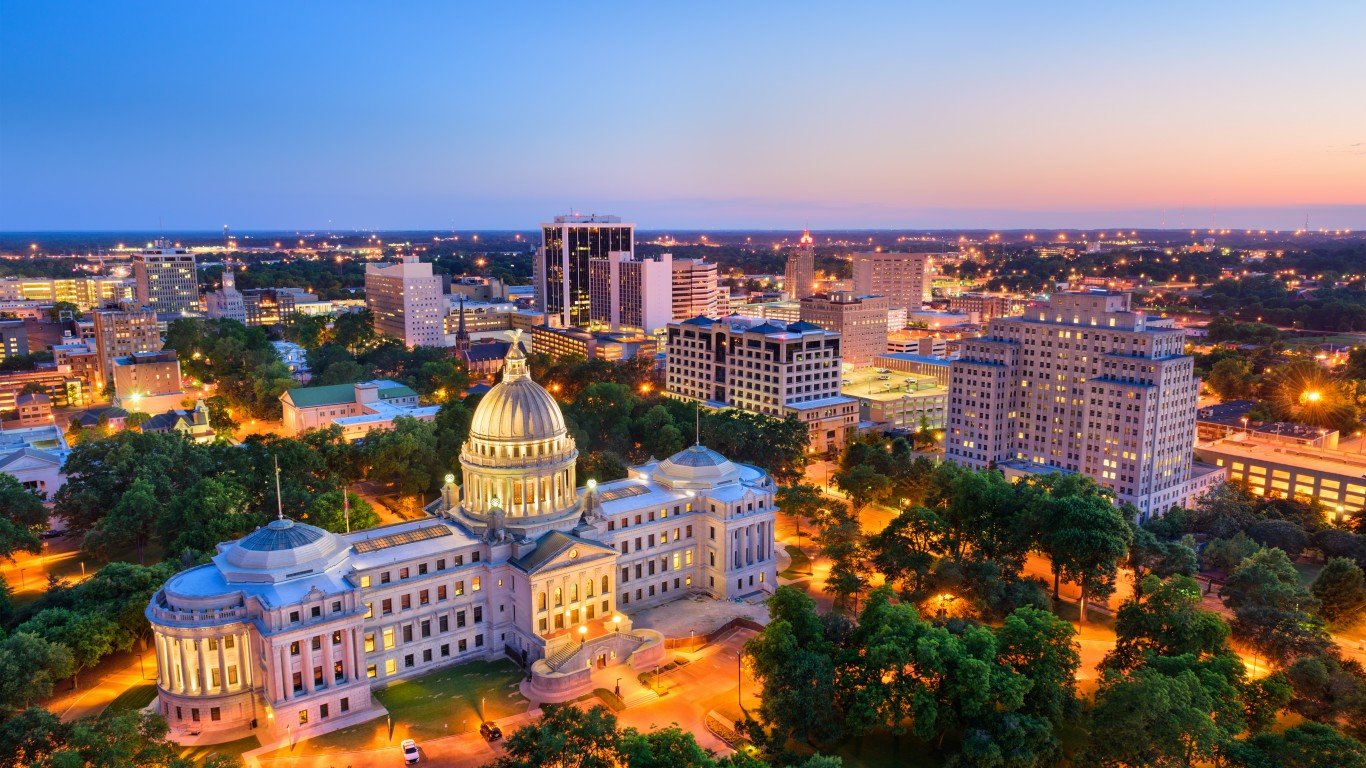
24. Mississippi
> Est. total retirement spending: $882,201 (the least)
> Avg. cost of living: 14.3% less than avg.
> Avg. monthly homeownership cost for senior citizens: $342 (3rd lowest)
> Pop. 65 and older: 15.9% (20th lowest)
With the nation’s lowest cost of living, Mississippi is the least expensive state in which to retire. Life expectancy in Mississippi at age 65 is over 17 years to 82.6 years, and living comfortably over those years — based on average annual spending of 65 and older households — will cost an estimated total of $882,201. Average housing costs for 65 and older households in Mississippi are $968 a month, less than housing costs for the same age group without a mortgage in a more expensive state, like New Jersey.
[in-text-ad-2]

25. Missouri
> Est. total retirement spending: $973,666 (12th least)
> Avg. cost of living: 10.5% less than avg.
> Avg. monthly homeownership cost for senior citizens: $452 (21st lowest)
> Pop. 65 and older: 16.9% (21st highest)
Missouri is one of only a dozen states where comfortable life in retirement age will cost an estimated total of less than $1 million. The relatively low cost is due both to a low cost of living and a low average life expectancy in the state. Goods and services are 10.5% less expensive in Missouri than they are on average nationwide, and life expectancy at age 65 is over 18 years to 83.6, below the over 19 years, to 84.4 years, national average life expectancy at age 65.
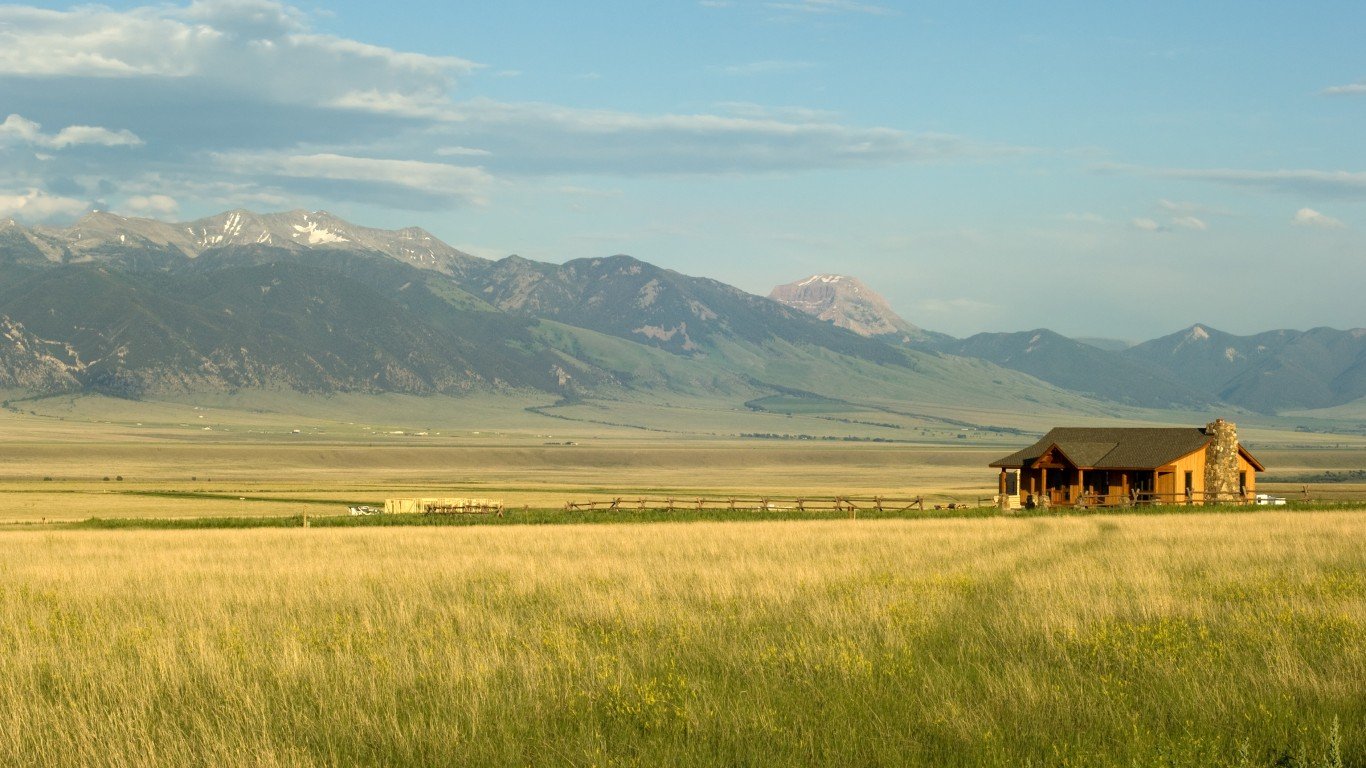
26. Montana
> Est. total retirement spending: $1,023,616 (18th least)
> Avg. cost of living: 5.4% less than avg.
> Avg. monthly homeownership cost for senior citizens: $441 (19th lowest)
> Pop. 65 and older: 18.8% (5th highest)
Montana has a relatively large elderly population. Some 18.8% of state residents are 65 or older, the fifth largest share among states. Based on the average spending of Americans in that age group, adjusted for Montana’s cost of living, and accounting for life expectancy, state residents can expect to spend about $1 million to through retirement to live comfortably — slightly less than average.
For man,y however, Social Security and savings are not enough to live comfortably into old age. In Montana, about 38.1% of retirement age households are still earning a wage or salary.
[in-text-ad]
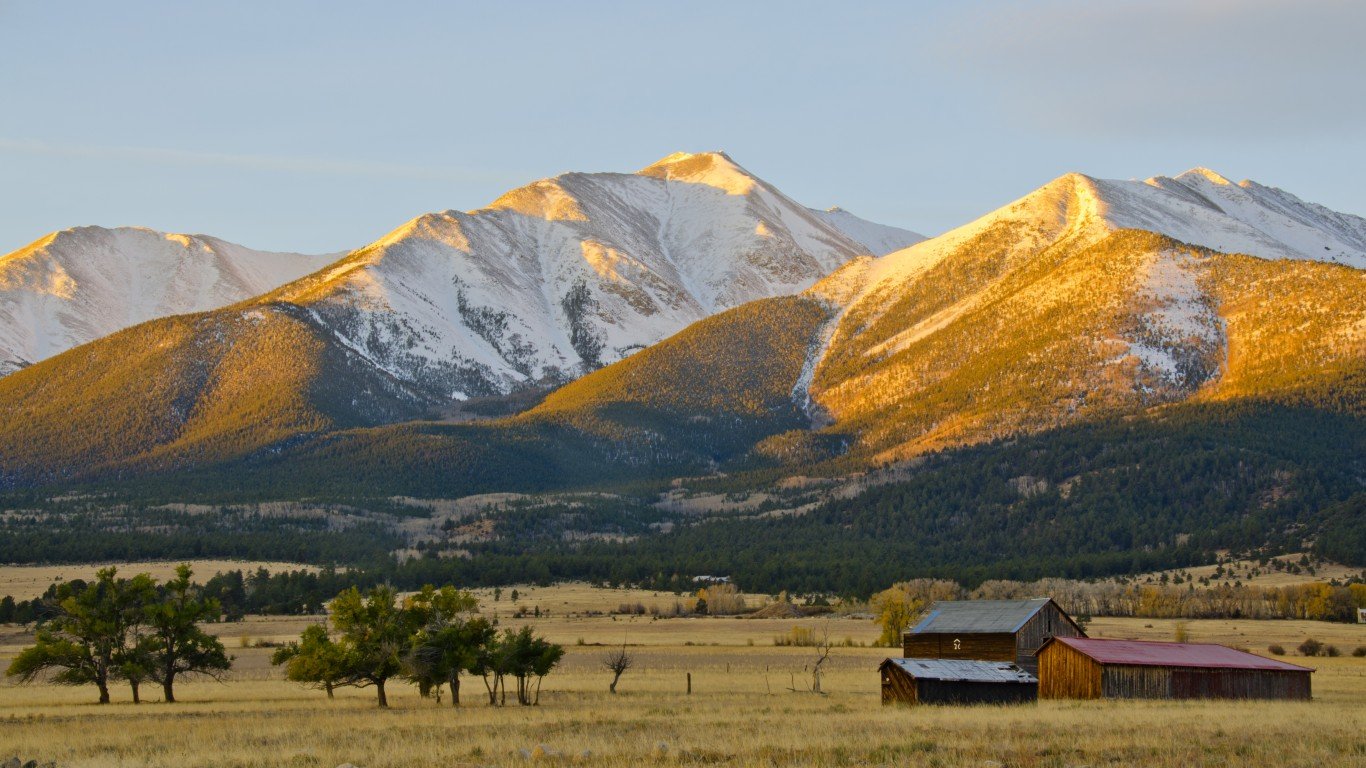
27. Nebraska
> Est. total retirement spending: $1,016,679 (17th least)
> Avg. cost of living: 10.4% less than avg.
> Avg. monthly homeownership cost for senior citizens: $509 (18th highest)
> Pop. 65 and older: 15.8% (17th lowest)
Thanks in part to a low cost of living — 10.4% less than the national average — retirement is less expensive in Nebraska than it is in most other states. The average life expectancy in Nebraska past age 65 is 19.4 years to 84.4, in line with the national average. Living comfortably in the state over that period will cost an estimated $1,016,679, compared to a national average of $1,134,687. Despite the lower retirement cost, just 15.8% of Nebraska’s population are 65 and older, a smaller share than in most states.

28. Nevada
> Est. total retirement spending: $1,078,911 (24th most)
> Avg. cost of living: 2.4% less than avg.
> Avg. monthly homeownership cost for senior citizens: $412 (16th lowest)
> Pop. 65 and older: 15.7% (15th lowest)
With a warm climate, Nevada may be an ideal destination for many Americans to retire. Retirement is also somewhat less expensive in the state than it is on average across the United States. Based on Nevada’s average life expectancy at age 65 of nearly 19 years to 83.9 years and a lower than average cost of living, state retirees would need to spend $1,078,911 from age 65 onward to live comfortably, about $56,000 less than the national average.
Still, just 15.7% of Nevada residents are of retirement age, a smaller share than in most states.

29. New Hampshire
> Est. total retirement spending: $1,188,122 (10th most)
> Avg. cost of living: 5.8% more than avg.
> Avg. monthly homeownership cost for senior citizens: $784 (4th highest)
> Pop. 65 and older: 18.1% (9th highest)
New Hampshire has a higher cost of living than most states, notably due to higher costs for housing and services. But seniors in the state appear to be more likely than most to be relatively financially secure, as just 5.5% of residents 65 and older live in poverty, compared to the national poverty rate for the age group of 9.4%. This is at least partially due to the fact that a relatively high 42.6% of households 65 and older continue to earn wages.
[in-text-ad-2]
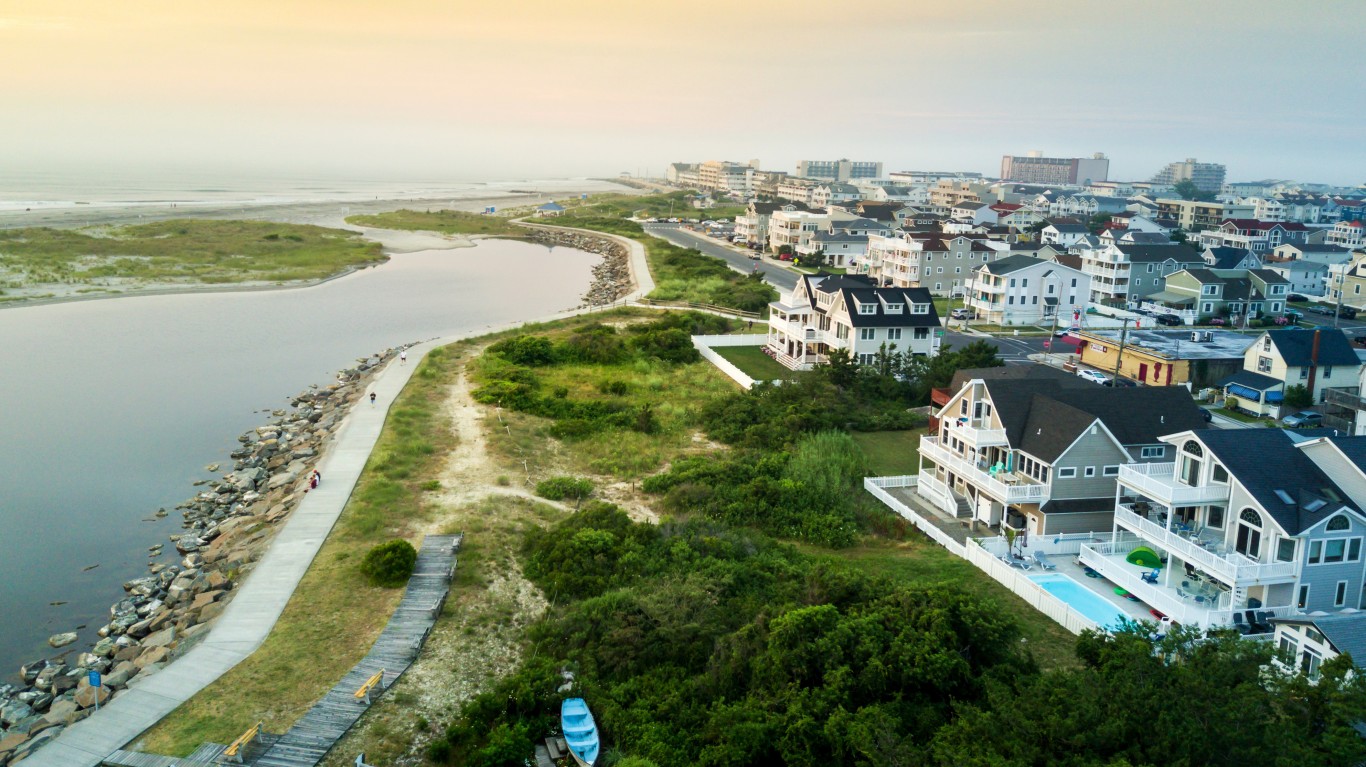
30. New Jersey
> Est. total retirement spending: $1,340,492 (4th most)
> Avg. cost of living: 12.9% more than avg.
> Avg. monthly homeownership cost for senior citizens: $986 (the highest)
> Pop. 65 and older: 16.1% (21st lowest)
Life expectancy at age 65 in New Jersey is over 20 years to 85.3 years, nearly a year longer than average. Additionally, goods and services are about 13% more expensive than they are on average nationwide. As a result, retirement is expensive in the Garden State. New Jersey residents looking to live comfortably should expect to spend about $1.3 million after age 65, more than in all but three states.
The high costs likely help explain why so many retirement-age New Jersey residents continue to work. Among 65 and older households in the state, 42.1% are still earning salaries or wages, well above the national average of 38.0%.

31. New Mexico
> Est. total retirement spending: $1,075,034 (25th least)
> Avg. cost of living: 6.7% less than avg.
> Avg. monthly homeownership cost for senior citizens: $357 (6th lowest)
> Pop. 65 and older: 17.6% (11th highest)
New Mexico falls roughly in the middle of all states in terms of the total expected lifetime expenditure for a retiree, at about $1.1 million. Life expectancy at 65 in the state is slightly higher than average, and cost of living in the state is slightly below average. It appears retirees in the state are among the least likely to be able to afford these expenses, as New Mexico has the highest poverty rate among residents 65 or older, at 13.3%, compared to a national 65+ poverty rate of 9.4%.
[in-text-ad]

32. New York
> Est. total retirement spending: $1,395,243 (2nd most)
> Avg. cost of living: 15.8% more than avg.
> Avg. monthly homeownership cost for senior citizens: $768 (5th highest)
> Pop. 65 and older: 16.4% (25th lowest)
New York is one of the most expensive states to live in the country. It also has the third longest life expectancy at 65. As a result, the state has the second highest estimated total spending for a comfortable retirement, at nearly $1.4 million over 20.6 years.
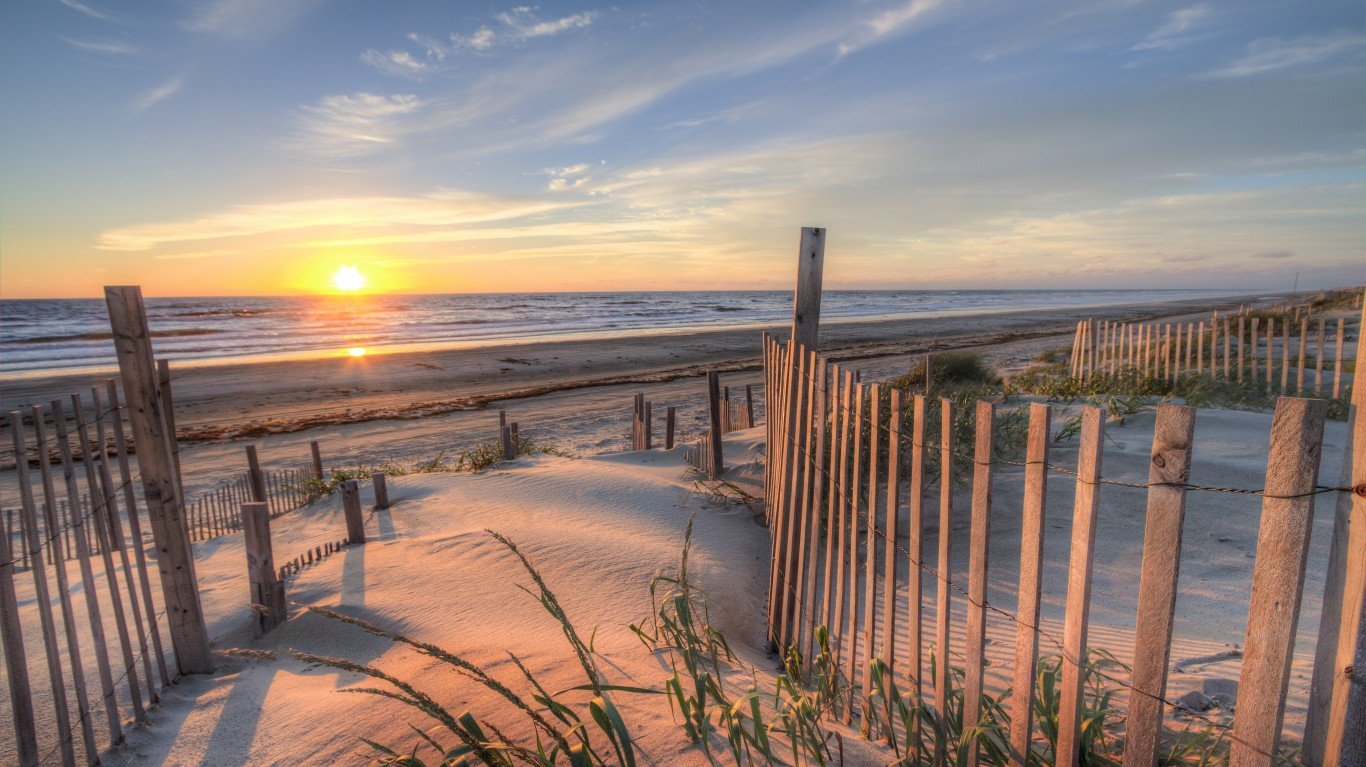
33. North Carolina
> Est. total retirement spending: $1,009,269 (16th least)
> Avg. cost of living: 8.7% less than avg.
> Avg. monthly homeownership cost for senior citizens: $405 (14th lowest)
> Pop. 65 and older: 16.3% (23rd lowest)
North Carolina has both below average cost of living and below average life expectancy, and so it ranks among the bottom third of states for expected retirement spending, at just over $1 million.
Owning a house in North Carolina is relatively inexpensive for senior citizens, with the typical home owned by seniors valued at $171,500, compared to the national median value of senior-owned homes of $217,000.

34. North Dakota
> Est. total retirement spending: $1,027,622 (20th least)
> Avg. cost of living: 9.9% less than avg.
> Avg. monthly homeownership cost for senior citizens: $456 (22nd lowest)
> Pop. 65 and older: 15.3% (7th lowest)
Goods and services are about 10% less expensive in North Dakota than they are, on average, nationwide. Partially as a result, at $1,027,622, the estimated cost to live comfortably in the state from age 65 on is about $107,000 less than the estimate for the nation.
Likely due in part to the lower retirement costs, North Dakota residents are less likely to have to work into retirement age. Just 37.5% of 65 and older households are earning wages or salaries, below the 38.0% national average.
[in-text-ad-2]

35. Ohio
> Est. total retirement spending: $946,340 (7th least)
> Avg. cost of living: 11.1% less than avg.
> Avg. monthly homeownership cost for senior citizens: $464 (24th lowest)
> Pop. 65 and older: 17.1% (17th highest)
Accounting for Ohio’s cost of living, which is 11.1% lower than the national average, state residents 65 and older spend an estimated $45,215 a year. That means that 65-year-olds in Ohio who live to be 83.2 years old — Ohio’s average life expectancy for those age 65 — can expect to spend $946,340 to live comfortably throughout the rest of their lives.
For many in the state, those expenses can be, at least partially, met through retirement savings and Social Security. Still, 36.0% of Ohio residents age 65 and up are still working.

36. Oklahoma
> Est. total retirement spending: $931,788 (6th least)
> Avg. cost of living: 11.0% less than avg.
> Avg. monthly homeownership cost for senior citizens: $401 (13th lowest)
> Pop. 65 and older: 15.7% (15th lowest)
Oklahoma is both one of the least expensive states to live and one with the shortest life expectancies at 65, at 17.9 years (to nearly 83), or 1.5 years less than the national life expectancy at 65. Homeownership for seniors in the state is relatively inexpensive, and the typical home owned by state residents 65 or older is worth $133,800, which is about $83,000 less than the national median home value for properties owned by residents 65 or older.
[in-text-ad]

37. Oregon
> Est. total retirement spending: $1,134,833 (17th most)
> Avg. cost of living: 0.5% less than avg.
> Avg. monthly homeownership cost for senior citizens: $531 (12th highest)
> Pop. 65 and older: 17.6% (11th highest)
Living out retirement in relative comfort will cost an estimated $1,134,833 in Oregon, almost exactly in line with the average cost nationwide. Oregon’s estimated cost of living is in line with the national average, and the average life expectancy in the state at age 65 is over 19 years to 84.5, only slightly higher than the 84.4 year national average.
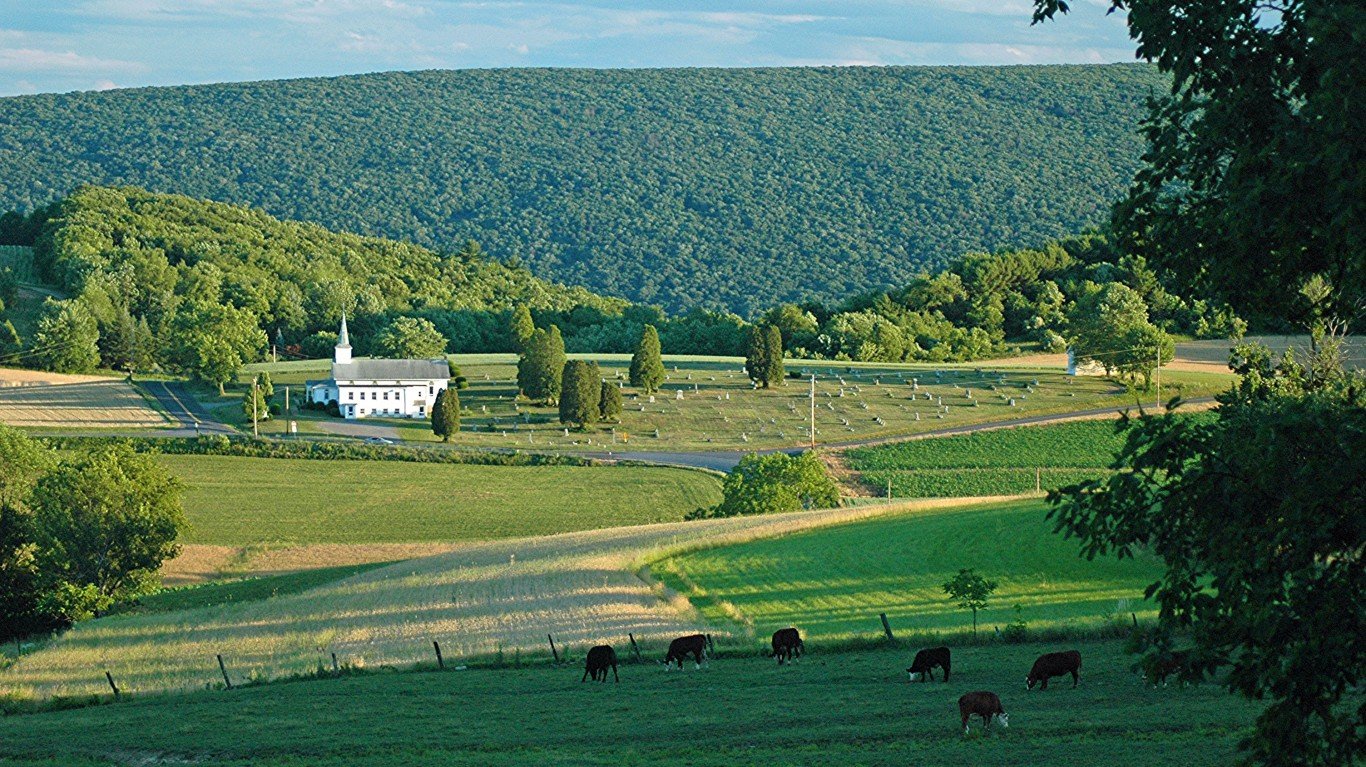
38. Pennsylvania
> Est. total retirement spending: $1,087,954 (23rd most)
> Avg. cost of living: 2.1% less than avg.
> Avg. monthly homeownership cost for senior citizens: $528 (14th highest)
> Pop. 65 and older: 18.2% (8th highest)
In Pennsylvania, 18.2% of residents are 65 or older, the eighth largest share of any state in the country. A comfortable retirement in the state will cost the average retiree a total of $1,087,954, about $48,000 less than the average cost nationwide.
Retirement-age adults in Pennsylvania are less likely to struggle financially than older Americans nationwide. Just 8.3% of Pennsylvania residents 65 and older live below the poverty line, a smaller share than the 9.4% of older adults nationwide.

39. Rhode Island
> Est. total retirement spending: $1,130,335 (19th most)
> Avg. cost of living: 1.4% less than avg.
> Avg. monthly homeownership cost for senior citizens: $699 (6th highest)
> Pop. 65 and older: 17.3% (14th highest)
Adjusting for the state’s cost of living, seniors living in Rhode Island can expect to spend just over $50,000 per year. Including a 15% financial cushion, a comfortable retirement will cost an estimated total of $1.1 million in Rhode Island. It appears that the state’s 65 and older residents are among the least likely to be able to afford those expenses, as the state has the fifth highest poverty rate among senior citizens, at 11.2%, compared to the national 65 and over poverty rate of 9.4%.
[in-text-ad-2]

40. South Carolina
> Est. total retirement spending: $967,595 (11th least)
> Avg. cost of living: 9.6% less than avg.
> Avg. monthly homeownership cost for senior citizens: $376 (9th lowest)
> Pop. 65 and older: 17.7% (10th highest)
South Carolina has a relatively large elderly population, at 17.7% of its total population, the 10th largest share among states. It also has a relatively affordable housing market, with below average monthly ownership costs for seniors, with and without a mortgage. Likely partially as a result, about 85% of the state’s 65 and over population owns the homes in which they live. With relatively low living costs for other goods and services as well, the total expected expenditure for retirees in the state is one of the lowest.

41. South Dakota
> Est. total retirement spending: $1,000,794 (14th least)
> Avg. cost of living: 11.8% less than avg.
> Avg. monthly homeownership cost for senior citizens: $464 (25th lowest)
> Pop. 65 and older: 16.6% (24th highest)
South Dakota is one of the least expensive states in the country to live in. Goods and services are an average of 11.8% less expensive in South Dakota than they are nationwide. Partially as a result, the estimated total cost of a comfortable retirement is about $134,000 less than it is on average across the United States as a whole.
Still, senior citizens in South Dakota are more likely than average to have to work into retirement age. Of state residents 65 and older, 44.6% are earning a wage or salary, a larger share than the 38.0% of retirement-age adults nationwide.
[in-text-ad]
42. Tennessee
> Est. total retirement spending: $957,020 (9th least)
> Avg. cost of living: 9.6% less than avg.
> Avg. monthly homeownership cost for senior citizens: $384 (10th lowest)
> Pop. 65 and older: 16.3% (23rd lowest)
Tennessee has one of the nation’s lower life expectancies at age 65, and it is also one of the least expensive states to live in. As a result, it is one of 12 states where the expected lifetime expenses in retirement for a comfortable living is less than $1 million.
The state’s low cost of living might help explain why a below-average share of state residents are still working after reaching the traditional retirement age. Just 36.2% of retirement age households in Tennessee are still earning a wage or salary, below the 38.0% national share.
43. Texas
> Est. total retirement spending: $1,089,299 (22nd most)
> Avg. cost of living: 3.0% less than avg.
> Avg. monthly homeownership cost for senior citizens: $480 (22nd highest)
> Pop. 65 and older: 12.5% (3rd lowest)
The estimated cost of comfortably living one’s retirement years in Texas is $1,089,299 — about $45,000 less than the average cost nationwide. Still, Texas residents are more likely than average to have to work into retirement age. Of the state’s 65 and older population, 42.6% are earning a wage or salary, the sixth highest share among states and well above the 38.0% national share.
Older Texans are also more likely than other elderly Americans to struggle financially. Of the state’s retirement age population, 11.1% live below the poverty line, a higher poverty rate in the age group than in all but five states and well above the 9.4% national rate.

44. Utah
> Est. total retirement spending: $1,106,319 (21st most)
> Avg. cost of living: 3.0% less than avg.
> Avg. monthly homeownership cost for senior citizens: $413 (18th lowest)
> Pop. 65 and older: 11.1% (the lowest)
Utah has a slightly lower than average cost of living, but a slightly higher than average life expectancy at 65. While, overall, total lifetime expenses for retirees is somewhat higher in Utah than in the majority of states, a relatively high share of state seniors appear able to comfortably afford those costs. Just 6.1% of state residents 65 and older live in poverty, the third lowest share among states.
[in-text-ad-2]

45. Vermont
> Est. total retirement spending: $1,187,034 (11th most)
> Avg. cost of living: 2.5% more than avg.
> Avg. monthly homeownership cost for senior citizens: $650 (7th highest)
> Pop. 65 and older: 19.8% (4th highest)
Vermont has one of the largest retirement age populations of any state. Nearly 20% of the state’s population are 65 or older, the fourth largest share among states. Life expectancy in the Green Mountain State is slightly higher than average, and so is the cost of living. As a result, a comfortable retirement in Vermont costs about $52,000 more than the national average.
The higher retirement costs may partially explain why Vermonters are more likely than most Americans to work past age 65. Of the state’s retirement age households, 44.9% earn a wage or salary, well above the 38.0% national share.

46. Virginia
> Est. total retirement spending: $1,164,487 (14th most)
> Avg. cost of living: 2.1% more than avg.
> Avg. monthly homeownership cost for senior citizens: $476 (24th highest)
> Pop. 65 and older: 15.5% (11th lowest)
Virginia is a relatively expensive state to retire, with a total estimated spending for a comfortable retirement of $1.16 million. Despite this fact, a below-average share of state residents continue to work after reaching retirement age. Those who do tend to be paid relatively well — senior households earning wages in the state have an average income of $67,522, the eighth highest figure among states.
[in-text-ad]

47. Washington
> Est. total retirement spending: $1,238,423 (8th most)
> Avg. cost of living: 6.4% more than avg.
> Avg. monthly homeownership cost for senior citizens: $594 (10th highest)
> Pop. 65 and older: 15.4% (9th lowest)
The estimated cost for a comfortable retirement in Washington state is $1,238,423, the eighth highest of any state. The higher retirement costs are attributable to both the state’s higher average cost of living and higher life expectancy at age 65.
Despite the higher retirement costs, savings and Social Security appear to be enough for a large share of the state’s 65 and older population in retirement. Just 35.8% of the retirement-age demographic in the state are working, below the 38.0% national average.

48. West Virginia
> Est. total retirement spending: $890,495 (2nd least)
> Avg. cost of living: 13.0% less than avg.
> Avg. monthly homeownership cost for senior citizens: $317 (the lowest)
> Pop. 65 and older: 20.0% (3rd highest)
A comfortable retirement in West Virginia will cost an estimated $890,495, the second least of any state and well below the $1.1 million national average. The state’s low cost of living — 13.0% less than the national average — partially explains why. Still, the lower total retirement cost is also attributable to West Virginia’s low life expectancy. Life expectancy for 65 year old residents in the state is just 17.5 years to 82.5 years, about two years below the national average.
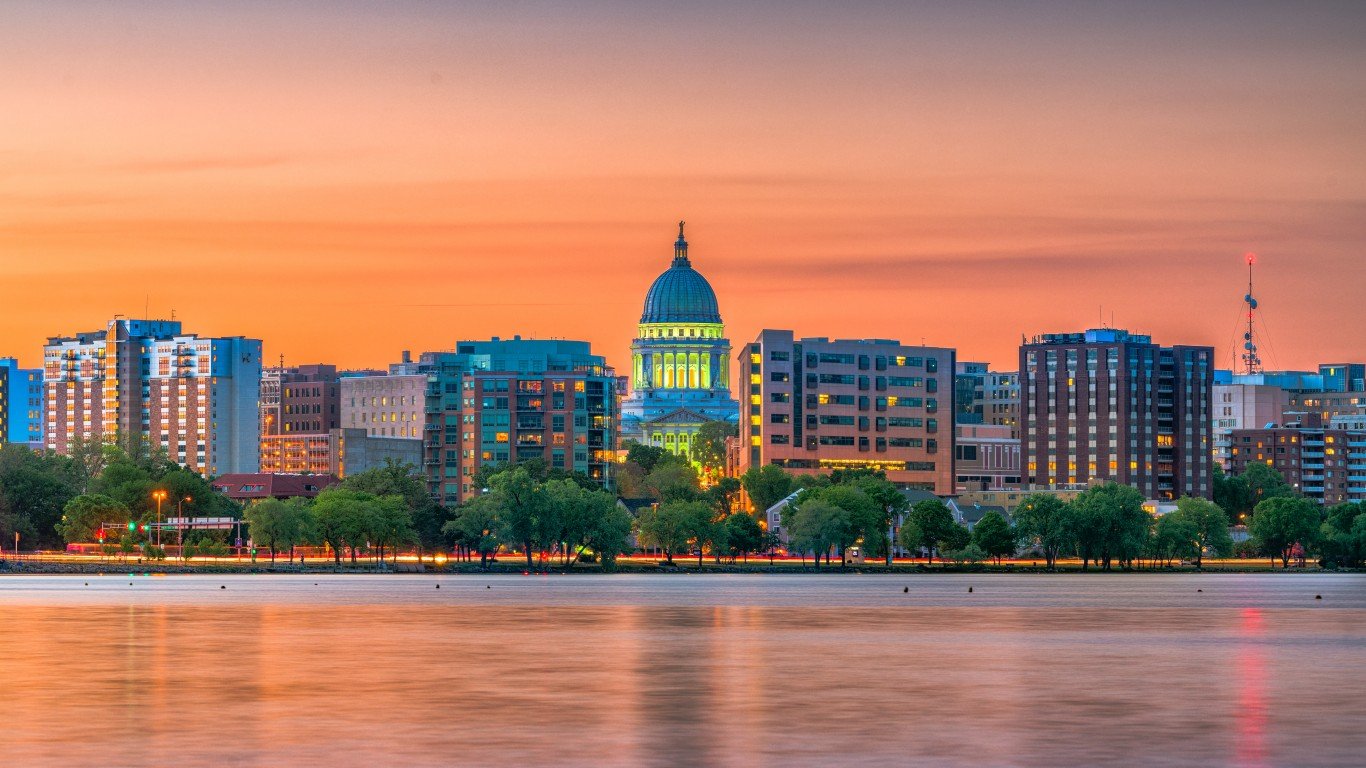
49. Wisconsin
> Est. total retirement spending: $1,064,664 (23rd least)
> Avg. cost of living: 7.6% less than avg.
> Avg. monthly homeownership cost for senior citizens: $529 (13th highest)
> Pop. 65 and older: 17.0% (18th highest)
Goods and services in Wisconsin are less expensive than in most other states, costing 7.6% less than the U.S. average. Life expectancy for state residents who reach 65 is 19.7 years to age 84.7, roughly in line with the national life expectancy at 65 of 19.4 years. The result is that the expected lifetime retirement costs in the state are slightly below that of the nation.
[in-text-ad-2]

50. Wyoming
> Est. total retirement spending: $1,069,085 (24th least)
> Avg. cost of living: 4.8% less than avg.
> Avg. monthly homeownership cost for senior citizens: $413 (17th lowest)
> Pop. 65 and older: 16.7% (23rd highest)
The estimated cost of comfortably living one’s retirement years in Wyoming is $1,069,085 — about $65,600 less than the average cost nationwide. Still, Wyoming residents are more likely than average to have to work into retirement age. Of the state’s 65 and older population, 42.0% are earning a wage or salary, the 12th highest share among states and well above the 38.0% national rate.
Methodology
To determine what it costs to retire comfortably in every state, 24/7 Wall St. calculated the amount of money needed to last the average retiree for the rest of his or her life using data from the Bureau of Labor Statistics, Bureau of Economic Analysis, and the Institute for Health Metrics and Evaluation. Our calculation was based on the average annual expenditure for U.S. residents 65 years and older in 2018 — $50,860 — according to the BLS Consumer Expenditure Survey. We adjusted that figure by local cost of living, using state-level data on regional price parity in 2017 from the BEA, and multiplied the result by 115% in order to reflect greater financial stability and comfort in retirement.
Finally, to determine the amount needed to last the average retiree for the rest of his or her life, we multiplied the adjusted annual expenditure figure by the number of years residents are expected to live at age 65, using state-level data from the IMHE’s Global Health Data Exchange for 2017.
Data on the share of the population that is 65 and over, the mean annual earnings for 65+ households, the share of 65+ households with earnings, the 65+ homeownership rate, and homeownership costs came from the U.S. Census Bureau’s 2018 American Community Survey. Monthly homeownership costs noted in the bullets indicate the average cost among the 65 and older population who do not have a mortgage. All data are for the most recent period available.
Sponsored: Want to Retire Early? Here’s a Great First Step
Want retirement to come a few years earlier than you’d planned? Or are you ready to retire now, but want an extra set of eyes on your finances?
Now you can speak with up to 3 financial experts in your area for FREE. By simply clicking here you can begin to match with financial professionals who can help you build your plan to retire early. And the best part? The first conversation with them is free.
Click here to match with up to 3 financial pros who would be excited to help you make financial decisions.
Thank you for reading! Have some feedback for us?
Contact the 24/7 Wall St. editorial team.
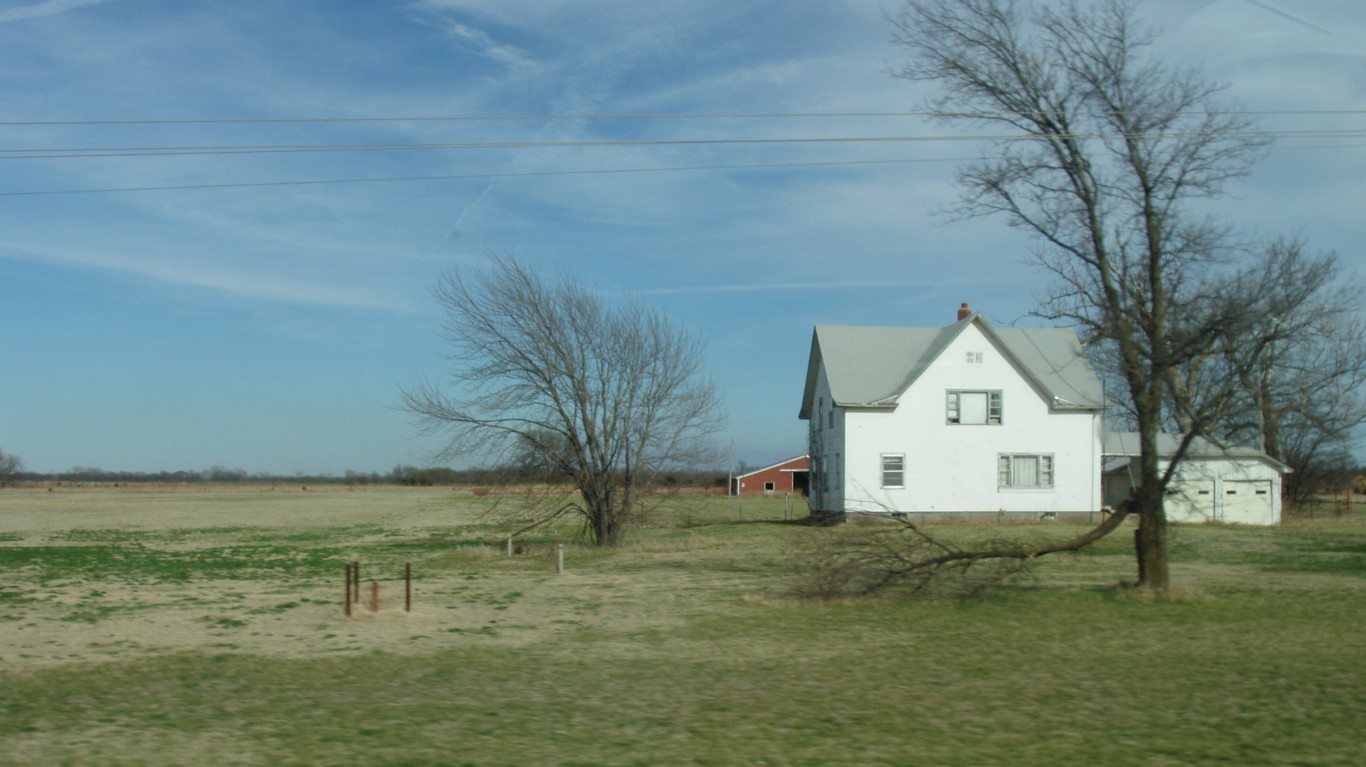
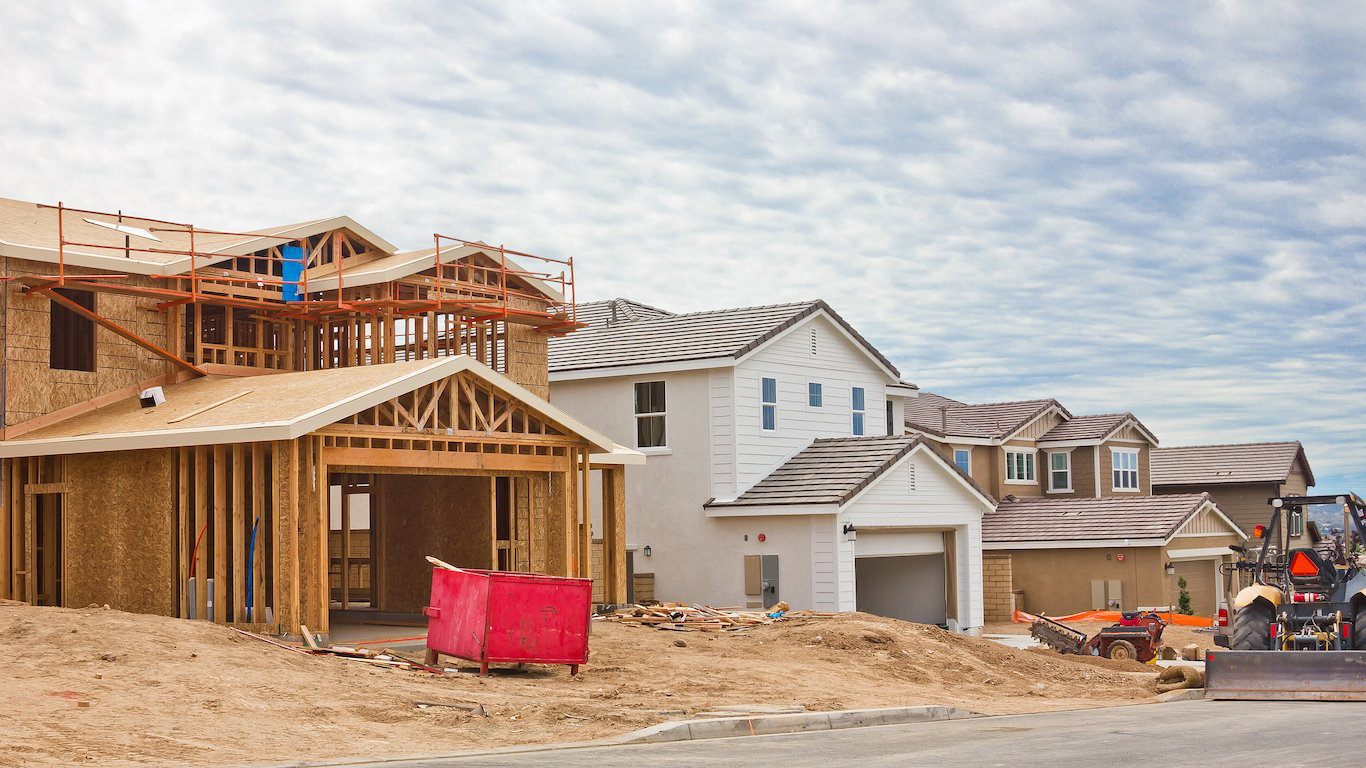 24/7 Wall St.
24/7 Wall St. 24/7 Wall St.
24/7 Wall St.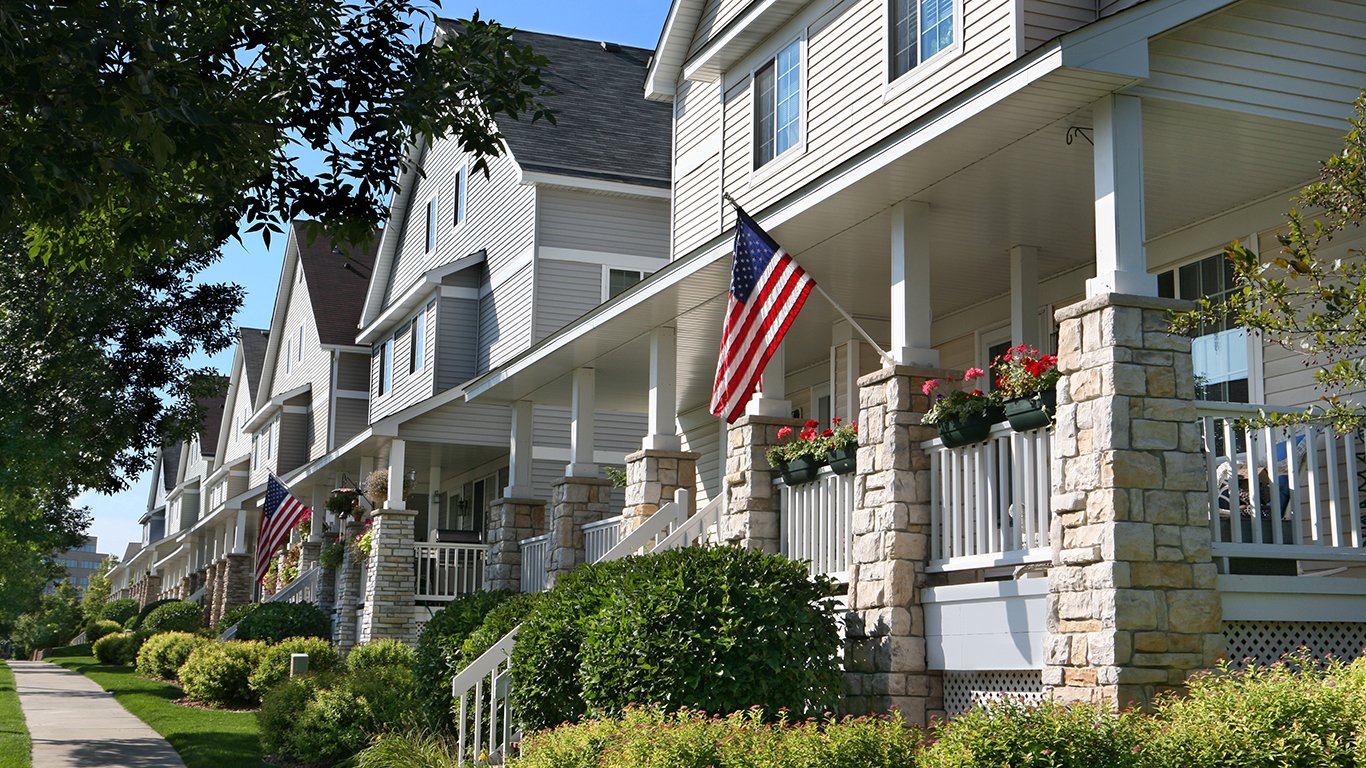 24/7 Wall St.
24/7 Wall St.